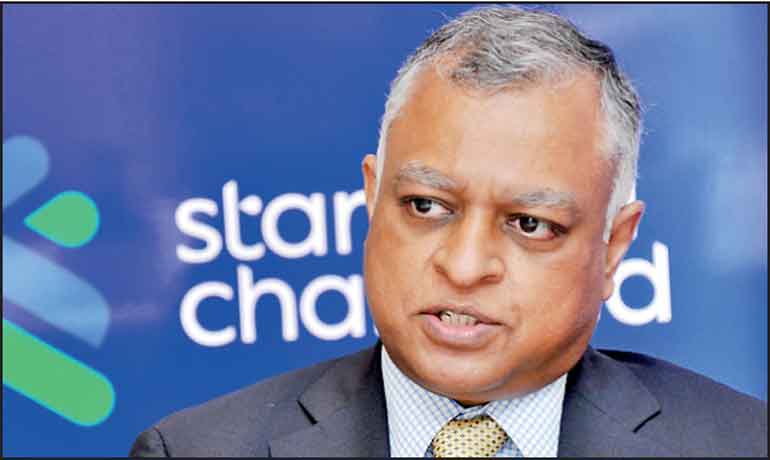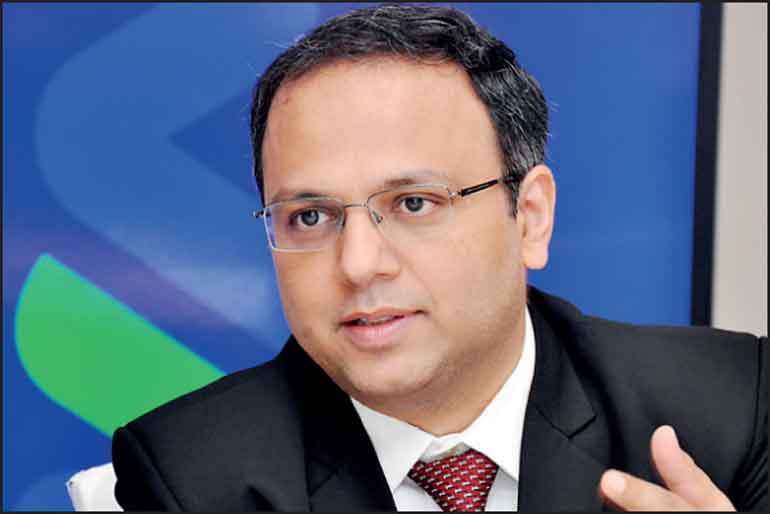Tuesday Feb 17, 2026
Tuesday Feb 17, 2026
Wednesday, 6 March 2024 00:00 - - {{hitsCtrl.values.hits}}

SCB Global Head, Fixed Income Research and Head, Asia Research Kaushik Rudra

SCB Sri Lanka CEO Bingumal Thewarathanthri

SCB Research Analyst - Macro Economics - South Asia Saurav Anand
By Nisthar Cassim
The Standard Chartered Bank rates that Sri Lanka in the past year had outperformed the banking giant’s expectations and foreign investor interest is sprouting but urged for continuous improvement as certain risks still remain along with multiple challenges.
“Global investor interest in Sri Lanka is on the rise as opposed to a sense of indifference a year ago. Some of the key positives include success so far in the External Debt Restructuring (ERD), reform initiatives and greater stability in markets. This progress has opened a window of opportunity for Sri Lanka among investors,” SCB’s Global Head, Fixed Income Research and Head, Asia Research Kaushik Rudra told the Daily FT on Monday.
In Colombo along with Research Analyst - Macro Economics - South Asia Saurav Anand for SCB’s annual research presentation to clients and other stakeholders, Rudra said timely conclusion of the ERD will further strengthen prospects for Sri Lanka among global investors.
SCB officials said as opposed to its own forecast Sri Lanka last year outperformed in terms of inflation, interest rates and currency, buildup of reserves, fiscal performance especially revenue mobilisation and ensuring financial system stability via early finalisation of Domestic Debt Optimisation (DDO).
During an interview with the Daily FT, the visiting duo along with SCB Sri Lanka CEO Bingumal Thewarathanthri said, much of the credit to the progress in the past year goes to strong leadership of President Ranil Wickremesinghe, the Central Bank and the Treasury as well as Sri Lanka pursuing with the International Monetary Fund’s four year $ 3 billion Extended Fund Facility (EFF) program.
Bingumal was of the view that to have made good progress on both external and domestic debt restructuring in less than two years was commendable and reflects the commitment both on the part of the Government and the creditors. He along with the visiting SCB executives emphasised the importance of Sri Lanka finalising the EDR by June to ensure the momentum is sustained. This will open up new and additional funding lines from both multilateral and bilateral sources.
“Sri Lanka has outperformed on multiple factors in the past year but risks especially on the domestic front still remain,” pointed out Anand. “Whilst tackling debt or its sustainability, Sri Lanka needs to spur a more sustainably higher growth if it is to bring down the debt to GDP ratio effectively. This also means stepping up public and private investments,” he added.
Noting that due to multiple crises Sri Lanka saw six consecutive quarters of negative growth until June last year hence there is a lot of catching up to do. For this apart from investments, improvement in productivity and reforms are key, said.
As per SCB Research estimates, the contraction of the economy in 2023 is around 2 or 2.5% though final data is yet to be released by the Department of Census and Statistics. However, SCB is more optimistic about the economy’s prospects in 2024 estimating a 3% growth. “Staying course with the IMF program, timely conclusion of debt restructuring and persisting with reforms can expand the scope for higher growth,” the SCB officials trip emphasised. Mindful of upcoming elections, they stressed that policy consistency in terms of attracting foreign direct investments, taxation and reforms are critical in the way forward.
Thewarathanthri said how Sri Lanka positions itself as a nation amidst geopolitics is another challenge. “Sri Lanka also can take advantage of the energy transition taking place in India and South Asia,” he said, adding that harnessing Sri Lanka’s massive renewable energy resourcefulness for export must be properly structured. The SCB Sri Lanka CEO also listed tourism, knowledge processing and logistics are high growth sectors for both FDIs, export of services, value and job creation.
Commenting on the external front, SCB’s Asia Research Head Kaushik Rudra said global growth is forecast to moderate this year to around 3.1% from 2.9% last year. He said deceleration is primarily from the developed market space – the US and Europe whilst China will also be softer on a relative basis. SCB research estimates global growth to pick up in 2025 with likely momentum in the latter half of this year.
It was noted that prospects would depend on inflation and easing of interest rates. “From a market standpoint, geopolitics has been under-appreciated. With the Russia Ukraine situation, it actually had a profound impact on inflation. Food prices inflation went down, oil price inflation went down, all of which contributed quite significantly to inflation. In the West, it was very much demand driven inflation. In Asia, it was supply driven and started picking up following the Russia Ukraine situation. With regard to the Middle East situation right now, there hasn’t been any shocks in terms of oil prices but it has started to impact the supply chain and if it aggravates, good inflation will appreciate,” Rudra pointed out.